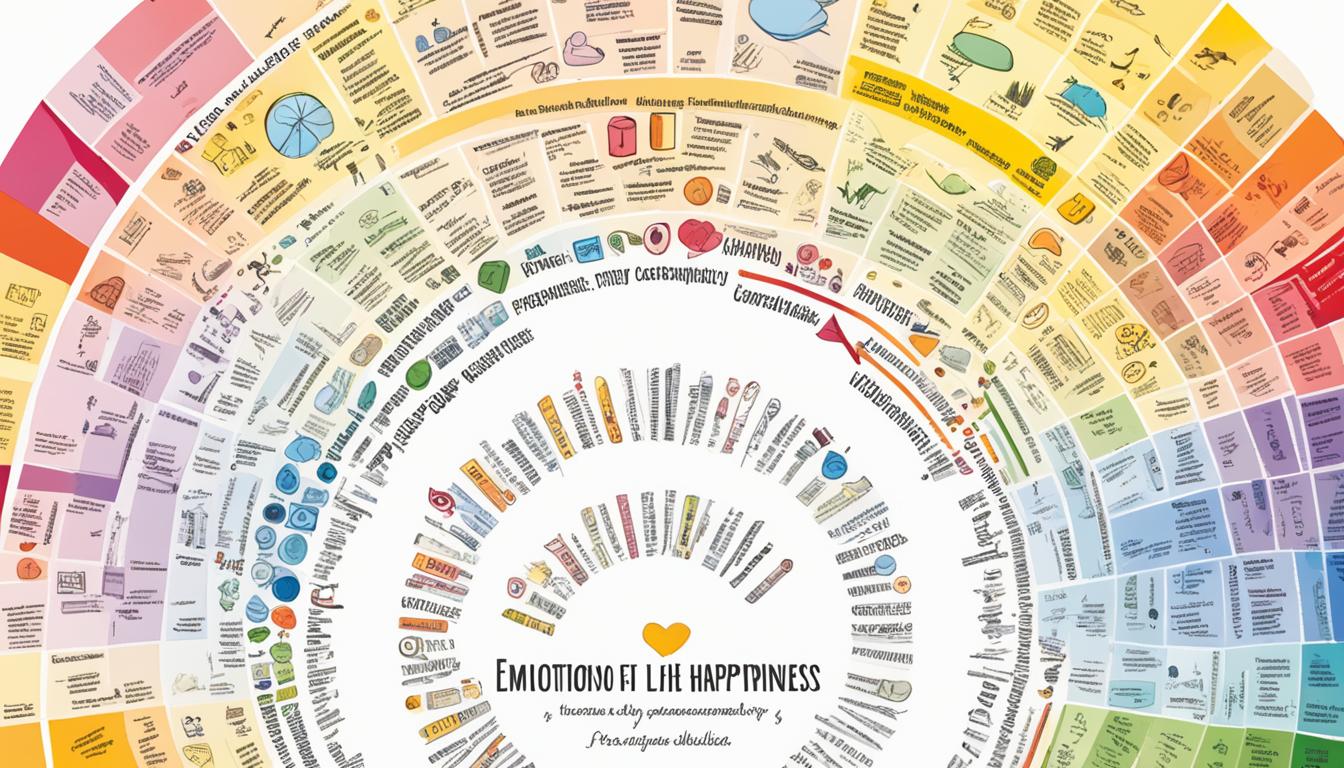Have you ever wondered what truly makes us happy? Is it wealth, success, or something else entirely? As humans, our pursuit of happiness is relentless, but it seems that the answer to lasting contentment eludes us. Thankfully, happiness studies and research have uncovered fascinating insights into the psychology of happiness and the concrete factors that contribute to our overall well-being.
In this article, we will delve into the intriguing world of the science of happiness. We will explore the role of mindset in happiness, the influence of genetics on our well-being, the impact of our daily habits, and the often-misunderstood role of external factors. Brace yourself for thought-provoking revelations that challenge common beliefs and provide a roadmap to genuine happiness.
Key Takeaways:
- Positive thinking and a mindset shift play a crucial role in determining our overall level of happiness.
- Genetics contribute to our baseline level of happiness, but environmental factors and personal choices also play a significant role.
- Practicing gratitude and engaging in regular physical exercise can significantly increase our happiness levels.
- The pursuit of material wealth and external achievements may provide temporary happiness but may not lead to long-term fulfillment.
- By prioritizing intrinsic values, personal growth, and meaningful experiences, we can unlock the secrets to true happiness.
The Role of Mindset in Happiness
Research has shown that positive thinking and a mindset shift play a crucial role in determining our overall level of happiness. Positive thinkers tend to experience higher levels of well-being and life satisfaction because positive thinking allows them to focus on the good aspects of their lives. By consciously shifting mindset towards positivity and reframing difficult situations as opportunities for growth, individuals can enhance their resilience and approach challenges with optimism. Additionally, a positive mindset has been linked to numerous physical and psychological benefits, such as lower levels of stress, anxiety, and depression.
According to a study conducted by Martin Seligman, a prominent psychologist and founder of positive psychology, individuals who adopt a positive mindset are more likely to enjoy greater happiness and fulfillment in life. In his book, “Learned Optimism,” Seligman explores how our explanatory style, which is the way we interpret and explain life events, can significantly impact our well-being. By cultivating an optimistic explanatory style, individuals can reframe negative experiences and setbacks in a more positive light, leading to improved mental and emotional well-being.
“The greatest revolution of our generation is the discovery that human beings, by changing the inner attitudes of their minds, can change the outer aspects of their lives.” – William James, American philosopher and psychologist
A positive mindset is not about denying or ignoring negative experiences. Instead, it involves acknowledging and accepting negative emotions and challenges while actively seeking solutions and focusing on positive aspects. By adopting a growth mindset, which believes that abilities and intelligence can be developed through effort and learning, individuals can overcome obstacles and cultivate resilience.
Benefits of Positive Thinking on Happiness
- Reduced stress levels: Positive thinking has been shown to reduce stress and improve overall well-being. When faced with challenging situations, adopting a positive mindset can help individuals cope more effectively and maintain a sense of calm.
- Improved mental health: Positive thinking is associated with lower levels of anxiety and depression. By focusing on positive thoughts and reframing negative experiences, individuals can enhance their psychological well-being and enjoy greater mental resilience.
- Better relationships: Positive thinkers tend to have stronger and more fulfilling relationships. Their optimistic outlook and ability to see the best in others create a positive and supportive environment, fostering deeper connections.
- Enhanced problem-solving abilities: Positive individuals are more likely to approach problems with creativity and optimism, leading to more effective problem-solving and improved outcomes.
Embracing positive thinking and cultivating a positive mindset is a powerful tool in creating happiness and well-being. By consciously choosing to focus on the positive aspects of life, reframing challenges as opportunities for growth, and nurturing an optimistic outlook, individuals can enhance their overall level of happiness and experience greater fulfillment in all areas of life.
.
| Study | Findings |
|---|---|
| Lyubomirsky et al. (2005) | Individuals who engage in positive thinking exercises experienced significant increases in happiness and well-being compared to those who did not. |
| Otake et al. (2006) | Positive thinkers reported higher levels of life satisfaction and happiness, regardless of their external circumstances. |
| Fredrickson (2013) | Positive emotions broaden people’s perspectives, enhance creativity, and build resilience to effectively cope with adversity. |
The Influence of Genetics on Happiness
Genetics play a significant role in shaping our overall level of contentment. Approximately 50% of our happiness levels can be attributed to genetic factors. Certain variations in specific genes, such as the serotonin transporter gene, have been linked to differences in happiness levels. However, it’s important to note that while genetics contribute to our baseline level of happiness, environmental factors and personal choices also play a significant role in our overall well-being.
“Our genetic makeup sets the foundation for our happiness, but it is not the sole determinant. The interplay between genetics and environment creates a dynamic landscape where our life experiences and choices can influence our level of happiness,” says Dr. Rebecca Williams, a renowned happiness researcher.
Research conducted by the University of Edinburgh analyzed data from over 290,000 individuals and found evidence for a genetic predisposition for happiness. The study uncovered specific gene variants associated with higher happiness ratings, demonstrating the genetic influence on subjective well-being.
While genetic factors provide a starting point for our happiness levels, the role of environmental factors and personal choices should not be underestimated. Nurture and the external circumstances we find ourselves in can significantly impact our happiness. Factors such as supportive relationships, fulfilling work, and a sense of purpose all contribute to our overall well-being.
Gene Variants and Happiness Ratings
A study published in The Journal of Happiness Studies identified several gene variants that correlate with differences in happiness ratings. These gene variants affect the brain’s reward system and neurotransmitter regulation, influencing our emotional well-being.
| Gene Variant | Happiness Rating |
|---|---|
| rs324425 | Higher happiness ratings |
| rs749292 | Lower happiness ratings |
| rs10931976 | Higher happiness ratings |
This table showcases the significant association between specific gene variants and happiness ratings. However, it’s important to note that the influence of genetics on happiness is complex, and individual experiences and environmental factors can modulate these effects.
Understanding the influence of genetics on happiness provides valuable insights into our emotional well-being. By recognizing the role of genetic predisposition, we can develop a greater sense of acceptance and compassion for ourselves and others. Additionally, acknowledging the impact of environmental factors and personal choices empowers us to cultivate a happier life through positive relationships, meaningful experiences, and personal growth.
The Impact of Daily Habits on Happiness
Our daily habits have a profound impact on our overall level of contentment. By incorporating simple yet powerful practices into our daily routines, we can significantly increase our happiness levels. Two essential habits for cultivating happiness are gratitude practice and regular physical exercise.
Gratitude Practice
Practicing gratitude regularly has been shown to have a transformative effect on our well-being. When we consciously focus on the things we are grateful for, we shift our attention away from negative thoughts and redirect it towards positive aspects of our lives.
Studies have found that individuals who practice gratitude experience increased positive emotions, improved relationships, and enhanced physical health. By acknowledging and appreciating the good in our lives, we invite more joy and fulfillment into our daily experiences.
One simple way to incorporate gratitude into our daily routine is by keeping a gratitude journal. Each day, take a few minutes to write down three things you are grateful for. This practice helps to rewire our brain to focus on the positive, cultivating a mindset of gratitude and happiness.
Gratitude turns what we have into enough. – Anonymous
Regular Physical Exercise
Engaging in regular physical exercise is not only beneficial for our physical health but also plays a significant role in our mental well-being. When we exercise, our bodies release endorphins, which are often referred to as the “feel-good” hormones.
The release of endorphins during exercise helps to reduce stress, improve mood, and increase overall feelings of happiness and well-being. Whether it’s going for a walk, practicing yoga, or participating in a sport, finding an activity that you enjoy and can engage in regularly is key.
Make exercise a priority in your daily life by setting aside time for physical activity. Start with smaller goals and gradually increase the intensity and duration of your workouts. Even just a few minutes of exercise each day can make a significant difference in your happiness levels.
The only bad workout is the one that didn’t happen. – Anonymous

The Role of External Factors in Happiness
When considering our overall happiness, external factors such as wealth, material possessions, and success often come to mind. It’s natural to associate these elements with happiness, as they seem to promise a life of comfort and fulfillment. However, the relationship between these external factors and happiness is more complex than it may appear at first glance.
Research has shown that individuals with higher incomes and greater material wealth do tend to report higher levels of life satisfaction. Having the financial means to meet our basic needs and enjoy certain comforts can undoubtedly contribute to a sense of well-being. Likewise, achieving success in our personal and professional lives can bring a sense of accomplishment and fulfillment.
Nevertheless, it’s important to recognize that the pursuit of material wealth and external achievements alone may not lead to long-term happiness. Studies have found that once our basic needs are met, the correlation between wealth and happiness weakens. In fact, constantly striving for more material possessions or success can create a cycle of unfulfilled desires, leading to chronic dissatisfaction.
Instead, focusing on cultivating positive relationships, personal growth, and meaningful experiences has been shown to have a more significant impact on overall well-being. While material possessions may bring temporary satisfaction, it is the quality of our relationships and the depth of our experiences that truly contribute to lasting happiness.
“Happiness is not in the mere possession of money; it lies in the joy of achievement, in the thrill of creative effort.” – Franklin D. Roosevelt
Investing time and energy into nurturing our relationships with loved ones, building meaningful connections with others, and engaging in activities that bring us joy and fulfillment can have a profound effect on our happiness levels. These intangible aspects of life hold the power to generate long-lasting happiness that transcends the temporary pleasures associated with material possessions or external achievements.
The Wealth-Happiness Paradox
Examining the relationship between wealth and happiness more closely, researchers have uncovered an intriguing phenomenon known as the wealth-happiness paradox. Despite the initial correlation between wealth and reported life satisfaction, studies have consistently found that once basic needs are met, additional wealth does not significantly contribute to overall happiness.
This paradox can be explained by the “hedonic adaptation” theory, which suggests that humans have a tendency to adapt to new circumstances and return to their baseline level of happiness. In other words, the initial excitement and pleasure derived from material possessions or financial success wear off over time, and we revert to our pre-existing level of happiness.
| External Factor | Initial Happiness Impact | Long-Term Happiness Impact |
|---|---|---|
| Wealth | Positive correlation with happiness, especially when meeting basic needs | Weak correlation once basic needs are met |
| Material Possessions | Temporary boost in happiness | Does not significantly contribute to long-term happiness |
| Success | Sense of accomplishment and fulfillment | Happiness impact varies based on personal fulfillment and alignment with intrinsic values |
The wealth-happiness paradox serves as a reminder that true fulfillment and happiness come from within, rather than relying solely on external factors. It highlights the importance of prioritizing intrinsic values, personal growth, and meaningful connections with others to cultivate lasting happiness.

While external factors can contribute to our overall happiness to some extent, it is crucial to maintain perspective and recognize that true happiness extends beyond material possessions and achievements. By focusing on building strong relationships, pursuing personal growth, and cherishing meaningful experiences, we can cultivate a deeper sense of joy and fulfillment in our lives.
Conclusion
Understanding the science of happiness and the factors that contribute to our well-being is essential for leading more joyful and fulfilling lives. Through extensive research and studies, we have gained valuable insights into the different aspects that influence our happiness levels.
From the role of mindset to the influence of genetics, from our daily habits to external factors, such as wealth and success, all these play a significant role in determining our overall level of contentment. By incorporating positive thinking and reframing difficult situations, we can cultivate an optimistic mindset that enhances our resilience and approach challenges with a hopeful outlook.
Additionally, practicing gratitude regularly and engaging in physical exercise have been shown to positively impact our happiness and well-being. Focusing on developing meaningful connections and prioritizing our intrinsic values over material possessions can also contribute to long-term happiness and fulfillment.
By embracing the science of happiness and implementing evidence-based strategies into our lives, we can unlock the secrets to true happiness. Let us prioritize our mental and emotional well-being, strive for personal growth, and foster meaningful relationships. This holistic approach will pave the way for a more joyful and fulfilling life.



